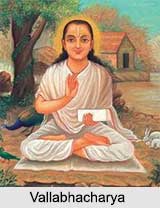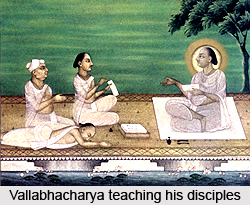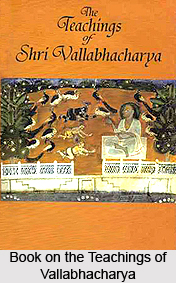Introduction
 Vallabhacharya was the founder of the Vaishnavite cult of Rajasthan and Gujarat. He was a devotional philosopher, who founded the Pushti sect and the philosophy of Shuddha Advaita in India. He was a contemporary of Sri Chaitanya Mahaprabhu. He composed many philosophical and devotional books. His impression on the public was an embodiment of knowledge.
Vallabhacharya was the founder of the Vaishnavite cult of Rajasthan and Gujarat. He was a devotional philosopher, who founded the Pushti sect and the philosophy of Shuddha Advaita in India. He was a contemporary of Sri Chaitanya Mahaprabhu. He composed many philosophical and devotional books. His impression on the public was an embodiment of knowledge.
Life of Vallabhacharya
Vallabhacharya was born in 1479 AD to Lakshmana Bhatta and Illamma. He was a Tailang Brahman belonging to the Telugu region but was born in Banaras. He received Sanskrit education. He started his education at the age of 7 years by studying four Vedas. He mastered the six systems of Indian philosophy. He also learnt philosophical systems of Adi Shankaracharya, Ramanuja, Madhvacharya, Nimbarka along with the Buddhist and Jain schools.
 Life of Vallabhacharya was spent in serving God and propagating the philosophy of Advaita Vedanta. He was the founder of Pushti Marg. His parents were Brahmin who was natives of Andhra Pradesh. His father was Lakshman Bhatt and Illamargaru was his mother. Parents of Lakshman had performed ninety-five "Yagnas". It was informed to him by his "Guru" that the birth of an "Avtar" would take place after completion of hundred Yagnas. His father had started from his village with his family members to reach Varanasi. During his stay in Varanasi he had performed all five Somayagnas. However owing to external circumstances he had to leave the place. On his way he halted at Champaranya, a forest area in Raipur District of Madhya Pradesh. The terror and physical strain suffered by his wife resulted in the premature birth of a child. As the child showed no signs of life the parents sadly placed it under a tree wrapped in a cloth and proceeded to the village. At night they had a dream in which God appeared and informed that he had been born as their child which they had thought as dead. They went to the spot and found the baby enveloped by fire as its protector. The mother received her divine baby from the fire. Vallabh was the name given to the child.
The face of the image of Shrinathji, came to light on Mount Govardhan on the very day when he was born. He inspired later Shrinathji to introduce Seva into Pushti Marg. The birth of Shri Vallabacharya coincided with the manifestation of the Mukharvind of Shrinathji. Later the entire family returned to Varanasi. His education started at the age of six with the study of the Vedas. At the age of eleven he had surpassed his teachers with his sharp reasoning. Shree Vallabhacharya meditated and spoked to his followers in a peaceful area.
His father passed away at the age of eleven. More than fifteen years of his life was spent in visiting various pilgrimages and expanding his teachings and perfecting his doctrines. During his trip to Gokarna he was invited by the king of Vijayanagara Empire. Here he introduced his views on Vedas, Gita, the Brahma-Sutras and the Bhagvat. When he was in Pandharpur, Shri Vitobha told him to get married so that the Pushti Marg could be spread for generations.
Life of Vallabhacharya was spent in serving God and propagating the philosophy of Advaita Vedanta. He was the founder of Pushti Marg. His parents were Brahmin who was natives of Andhra Pradesh. His father was Lakshman Bhatt and Illamargaru was his mother. Parents of Lakshman had performed ninety-five "Yagnas". It was informed to him by his "Guru" that the birth of an "Avtar" would take place after completion of hundred Yagnas. His father had started from his village with his family members to reach Varanasi. During his stay in Varanasi he had performed all five Somayagnas. However owing to external circumstances he had to leave the place. On his way he halted at Champaranya, a forest area in Raipur District of Madhya Pradesh. The terror and physical strain suffered by his wife resulted in the premature birth of a child. As the child showed no signs of life the parents sadly placed it under a tree wrapped in a cloth and proceeded to the village. At night they had a dream in which God appeared and informed that he had been born as their child which they had thought as dead. They went to the spot and found the baby enveloped by fire as its protector. The mother received her divine baby from the fire. Vallabh was the name given to the child.
The face of the image of Shrinathji, came to light on Mount Govardhan on the very day when he was born. He inspired later Shrinathji to introduce Seva into Pushti Marg. The birth of Shri Vallabacharya coincided with the manifestation of the Mukharvind of Shrinathji. Later the entire family returned to Varanasi. His education started at the age of six with the study of the Vedas. At the age of eleven he had surpassed his teachers with his sharp reasoning. Shree Vallabhacharya meditated and spoked to his followers in a peaceful area.
His father passed away at the age of eleven. More than fifteen years of his life was spent in visiting various pilgrimages and expanding his teachings and perfecting his doctrines. During his trip to Gokarna he was invited by the king of Vijayanagara Empire. Here he introduced his views on Vedas, Gita, the Brahma-Sutras and the Bhagvat. When he was in Pandharpur, Shri Vitobha told him to get married so that the Pushti Marg could be spread for generations.
He settled down in Varanasi and married Madhu Mangalam. He had two sons also. He detached himself from the world at the age of fifty two and started meditating and singing the songs of praise of Lord Krishna. Prior to this he took a vow of silence on the Hanuman Ghat in Varanasi at the bank of Ganga River.
Teachings of Vallabhacharya
Vallabhacharya taught that there was no distinction between Brahmin and the individual soul and the latter could get rid of bondage by Bhakti. He asked his followers to offer everything in the service of Krishna. According to Vallabhacharya only individuals who have the grace of Krishna can be successful in the path of devotion. He advocated the worship of idols of Krishna. Later the rituals of this sect became very complicated. Many followers of Vallabhacharya composed poems on Krishna in Hindi language and thus contributed greatly to the spread of Krishna cult.
The Krishna cult is called, `seva` and also known as Pushtimarga. Pushtimarga, the path of divine grace is based on the "Vishudhadvaita" philosophy, initially shown by Shri Vallabhacharya. He strongly suggested that Lord Shri Krishna is the ultimate God. Thus, Shri Krishna`s blessings alone and only can free humans from the painful cycle of birth and death.
 Teachings of Vallabhacharya mainly revolve around pure Bhakti. His philosophy was known as vishuddhadvaita Vedanta or pure dualism. According to him, the soul is separate from God and the realization of God is the ultimate aim of a soul. He instituted a path known as `pushti marg` or pure Bhakti. He proclaimed that the Brahma Sutra, Bhagvad and the Bhagavad Gita supported the path of pushti or God`s grace. Pushti is the divine love of Krishna in the heart of a devotee. He also emphasized becoming devotionally involved through the feeling of `vatsalya` or maternal love for Lord Krishna.
Teachings of Vallabhacharya mainly revolve around pure Bhakti. His philosophy was known as vishuddhadvaita Vedanta or pure dualism. According to him, the soul is separate from God and the realization of God is the ultimate aim of a soul. He instituted a path known as `pushti marg` or pure Bhakti. He proclaimed that the Brahma Sutra, Bhagvad and the Bhagavad Gita supported the path of pushti or God`s grace. Pushti is the divine love of Krishna in the heart of a devotee. He also emphasized becoming devotionally involved through the feeling of `vatsalya` or maternal love for Lord Krishna.
He opposed the philosophy of Adi Shankaracharya. He declared that the existence of the soul is as true as existence of God. According to him without Bhakti, a soul cannot accomplish peace. As he world evolved from so it is as true as God. There is a personal form attached to God. He supported the non-dualistic view of the soul and God. Despite that he introduced his Shuddhadvaita philosophy of the soul and God. He inspired souls to do self-sacrificing devotion to Lord Krishna.
It was necessary to renounce the desire for the outcome of experienced and Vedic actions. Eternal service of Lord Krishna is the aim of a soul. Self-pride and worldly affection should be renounced and everything should be ordered at Krishna`s feet. One should keep oneself away from all kinds of off-putting elements of the world thereby receiving the grace of Lord Krishna through Bhakti. In order to attain the divine service of Lord Krishna is liberation. His teachings revolve round the conception of a personal and benevolent God who is Sat-Chit-Ananda. Maha-Pushti is the highest grace which helps the aspirants to attain God-realisation.
He does not admit Maya and believes that the whole world of matter and souls is not an illusion but a subtle form of God. According to him Brahman can create the world without principles like Maya. Creation is expression of Brahman. Universe is eternal and real as Brahman himself. World is not illusory and it`s not different from Brahman in spirit. This philosophy is known as Shuddhadvaita. He preached the Vaishnava cult and philosophy.
The Jivas are actually not effects. They are parts of God. The individual soul is part; however, there is no difference between Brahman and the individual soul. The individual soul is identical with Brahman. It is as real and eternal as Brahman himself.
Works of Vallabhacharya
Shri Vallabhacharya wrote many books, but many of them are not available today due to lack of proper perseverance. The important works of Vallabhacharya are "Vyasa Sutra Bhashya", "Jaimini Sutra Bhasya", "Bhagavata Tika Subodhini", "Pushti Pravala Maryada" and "Siddhanta Rahasya". All these books are in Sanskrit. Vallabhacharya has written many books in Brij Bhasha also.
Vallabhacharya spent his last days at Varanasi. He thought that his life"s mission had been accomplished. In the presence of a host of spectators he ascended the sky and disappeared. Shri Vallabhacharya breathed his last in the year 1531.
Temple of Saint Vallabhacharya
 Champaran, formerly known as Champajhar, is a village in Raipur district, 60 km from the state capital via Arang. The village is identified with Champaranya and therefore has religious significance as the birthplace of the Saint Vallabhacharya, the reformer and founder of the Vallabh sect. A handsome temple has been constructed in his honour. Near this temple is a temple of Champakeshwara Mahadeva. The birth anniversary of Saint Vallabhacharya is celebrated every year on the 11th day of `Baisakh`, attended by thousands followers of the Sect, to pay Him homage. An annual fair is held in Champaran with great carousing in the month of `Magh`, every year.
Champaran, formerly known as Champajhar, is a village in Raipur district, 60 km from the state capital via Arang. The village is identified with Champaranya and therefore has religious significance as the birthplace of the Saint Vallabhacharya, the reformer and founder of the Vallabh sect. A handsome temple has been constructed in his honour. Near this temple is a temple of Champakeshwara Mahadeva. The birth anniversary of Saint Vallabhacharya is celebrated every year on the 11th day of `Baisakh`, attended by thousands followers of the Sect, to pay Him homage. An annual fair is held in Champaran with great carousing in the month of `Magh`, every year.
Champaran is accessible from Raipur via Arang. From the junction of Arang-Ranjim Road at the village of Jonda, there is a paved road leading towards Champaran. Buses are available from both Raipur and Arang.




















